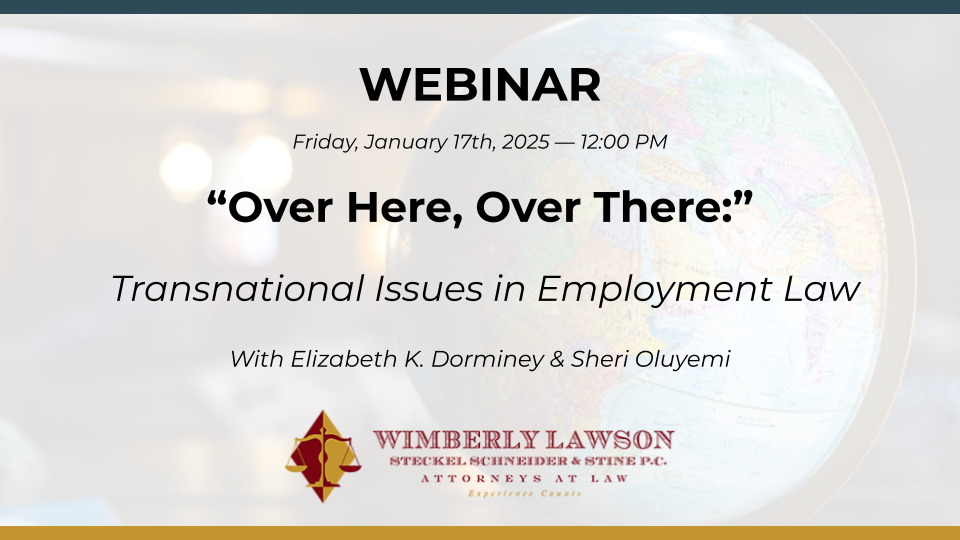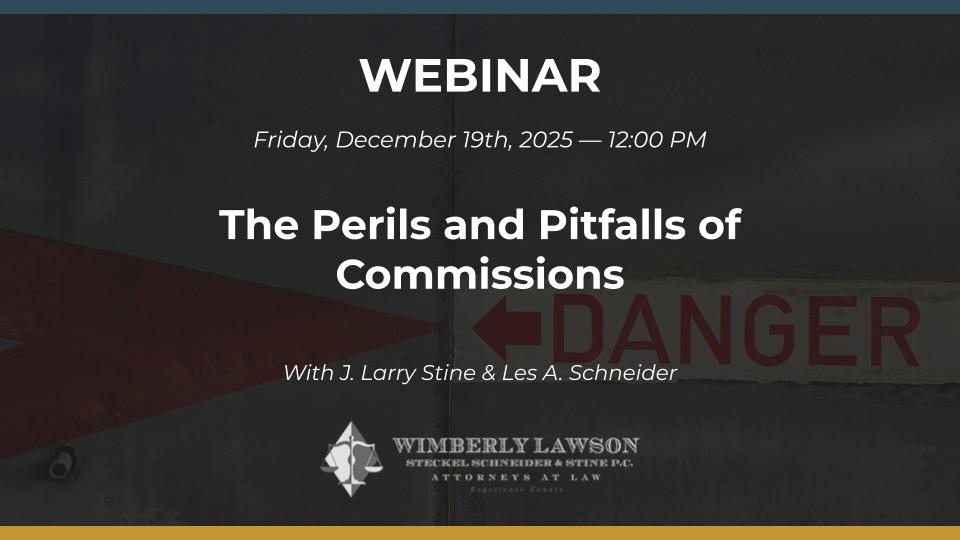
Webinar: Love is a Battlefield: The Intersection of Workplace Romance and Sexual Harassment
An employer cannot stop employees from developing romantic relationships at work, but it can manage those relationships so that they do not turn into sexual harassment claims. In this Webinar, we will discuss the types of written policies and procedures a company can implement to prevent legal claims and minimize unnecessary distractions in the workplace. Because hell hath no fury like a woman—or man—scorned by a workplace romance.
Presented by Paul Oliver & Sheri Oluyemi.
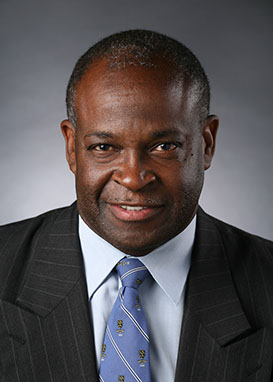

Watch This Webinar
Presentation Slides
Slide 1
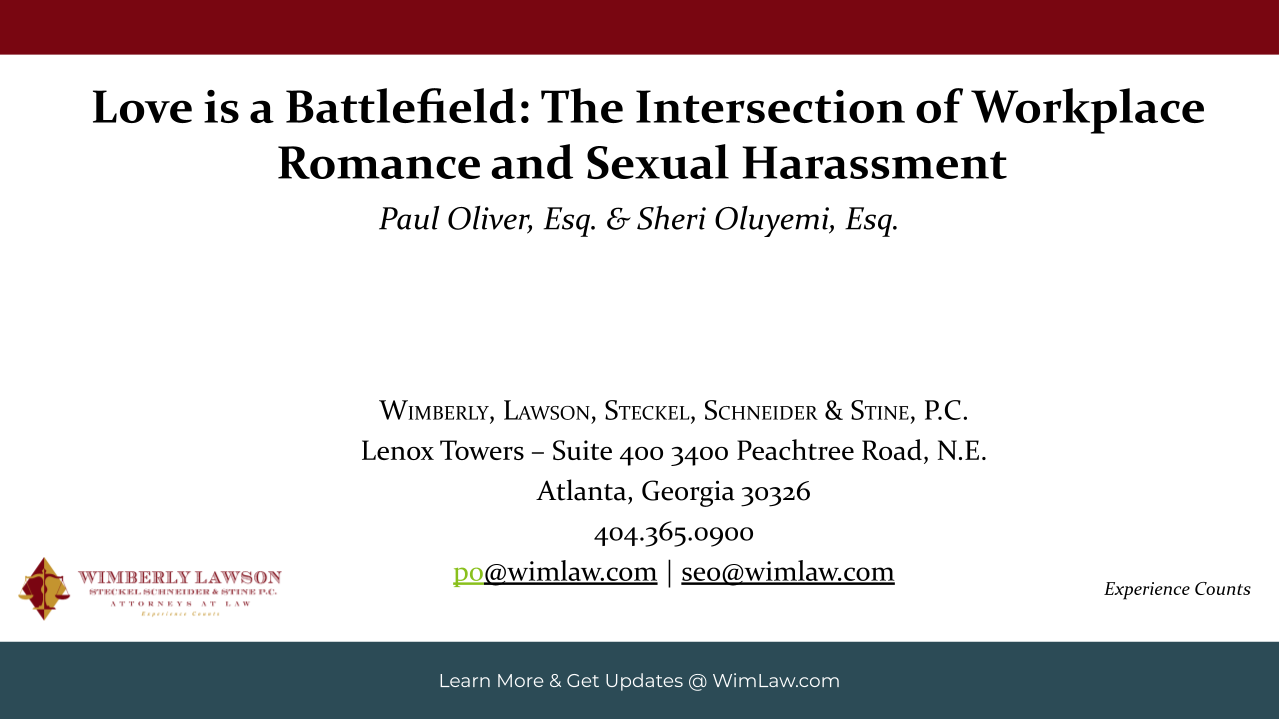
Slide 2
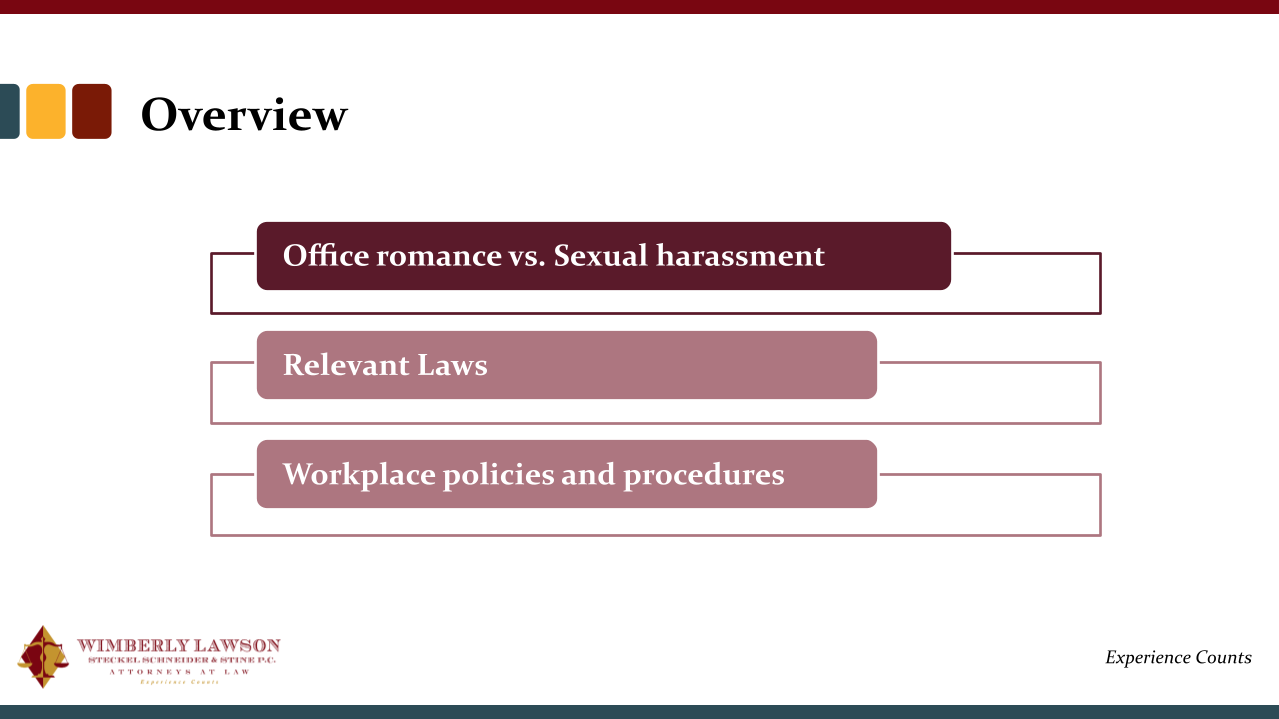
Slide 3
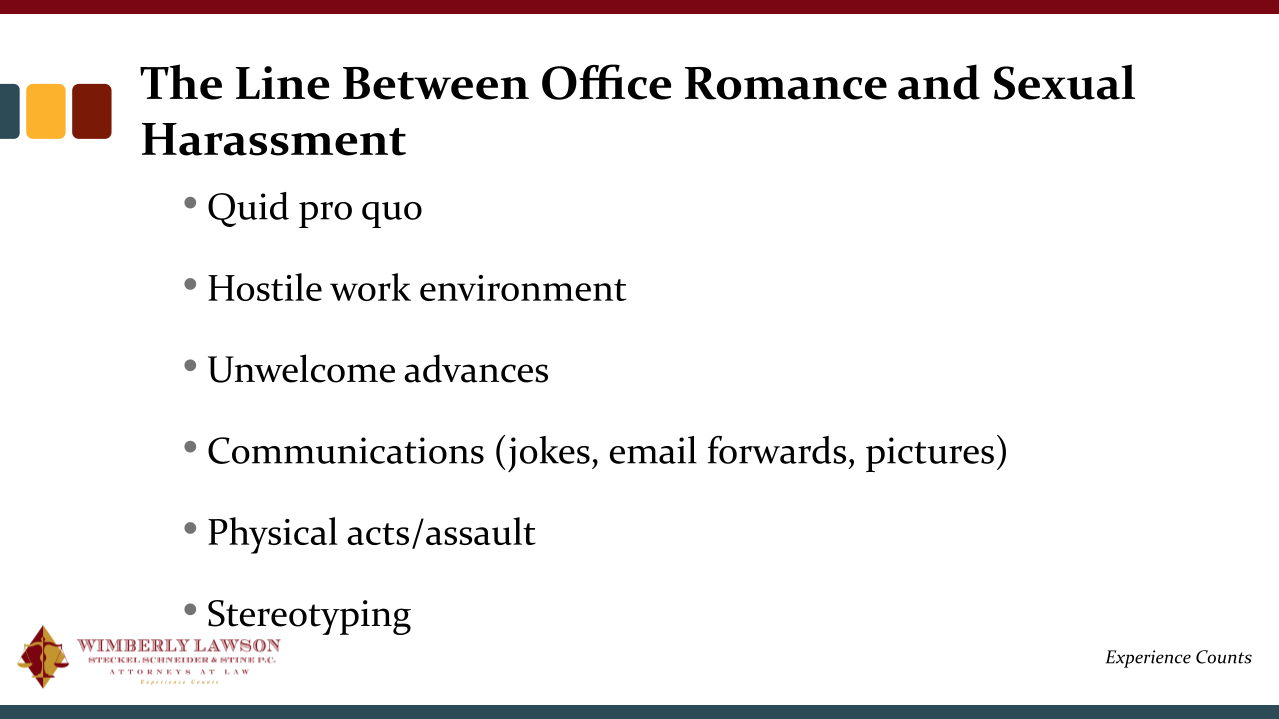
Slide 4
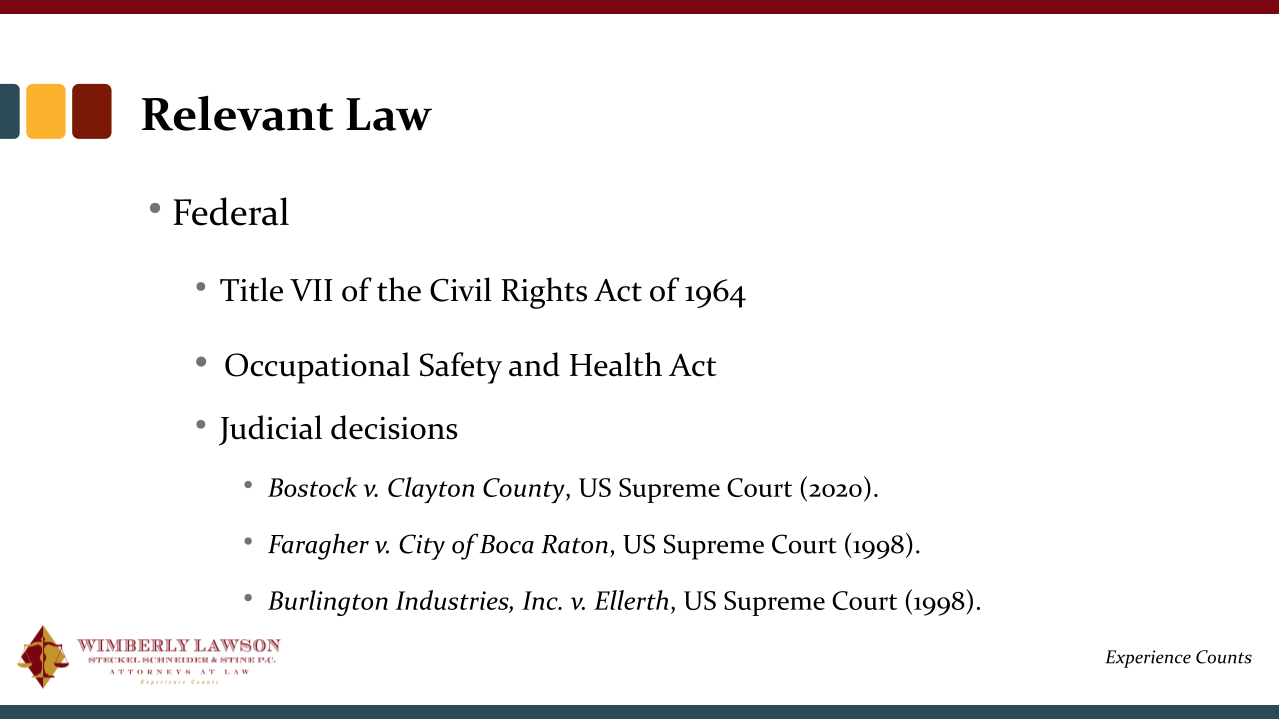
Slide 5
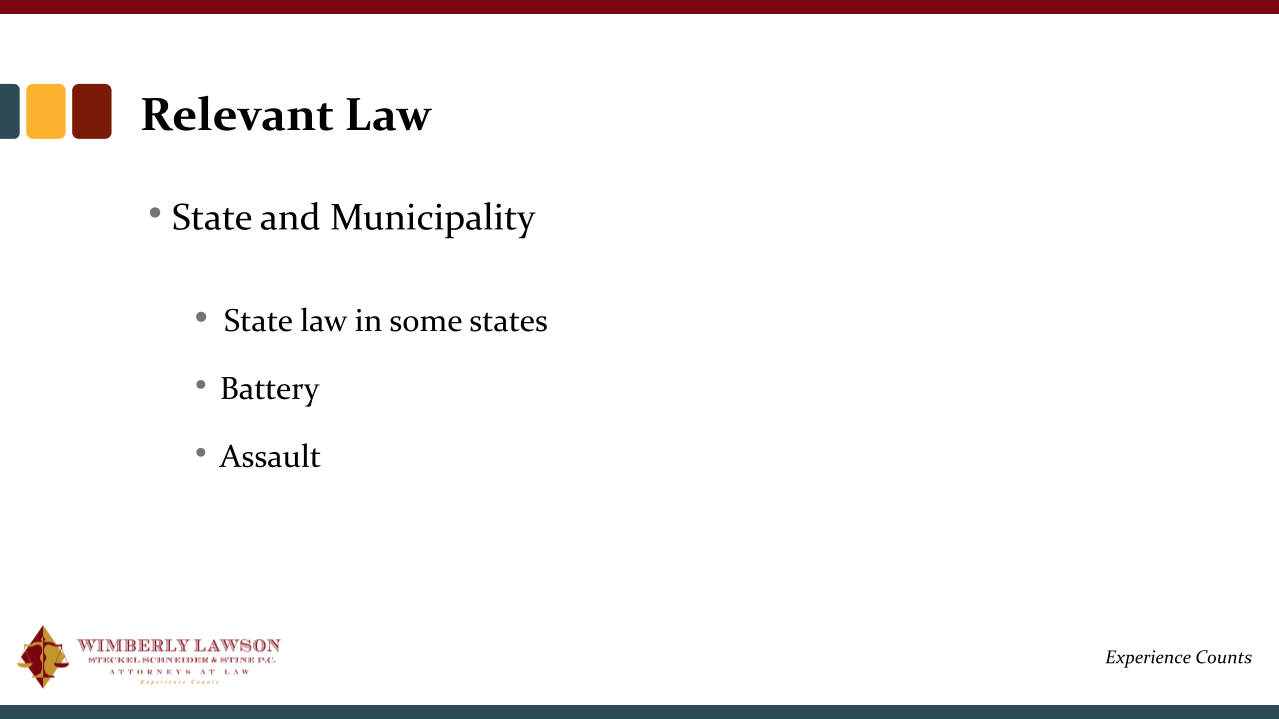
Slide 6
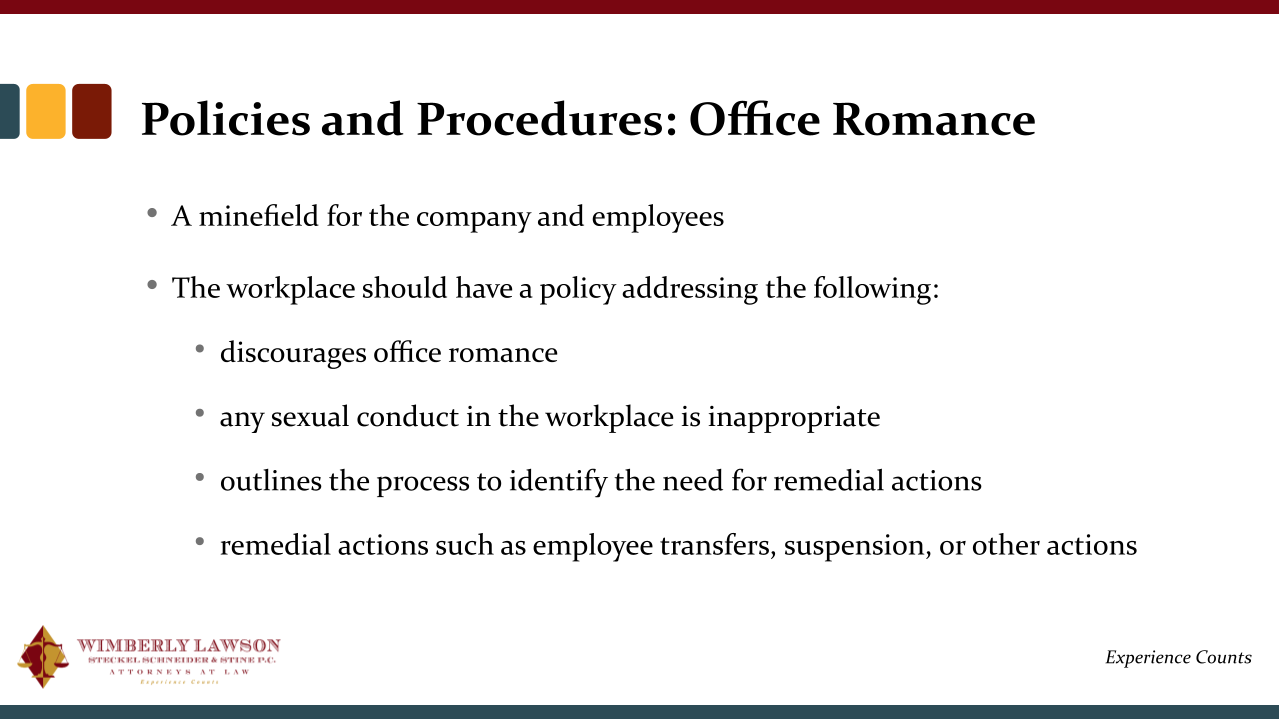
Slide 7
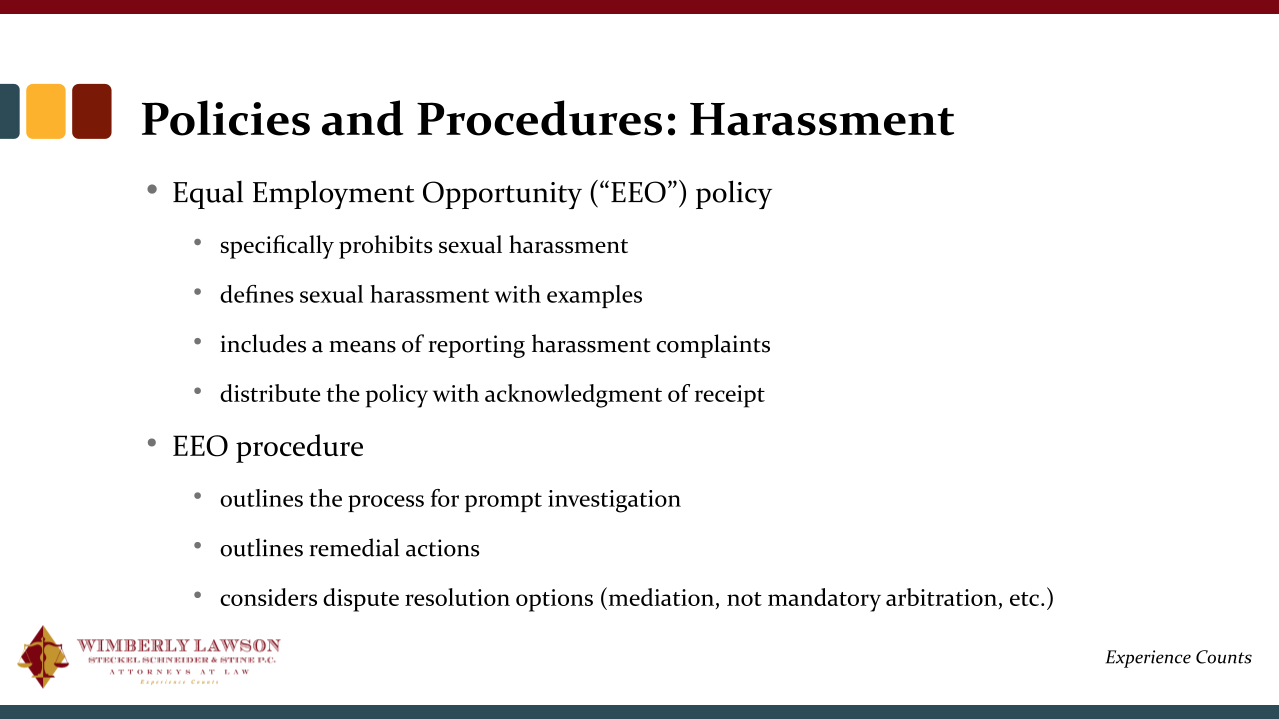
Slide 8
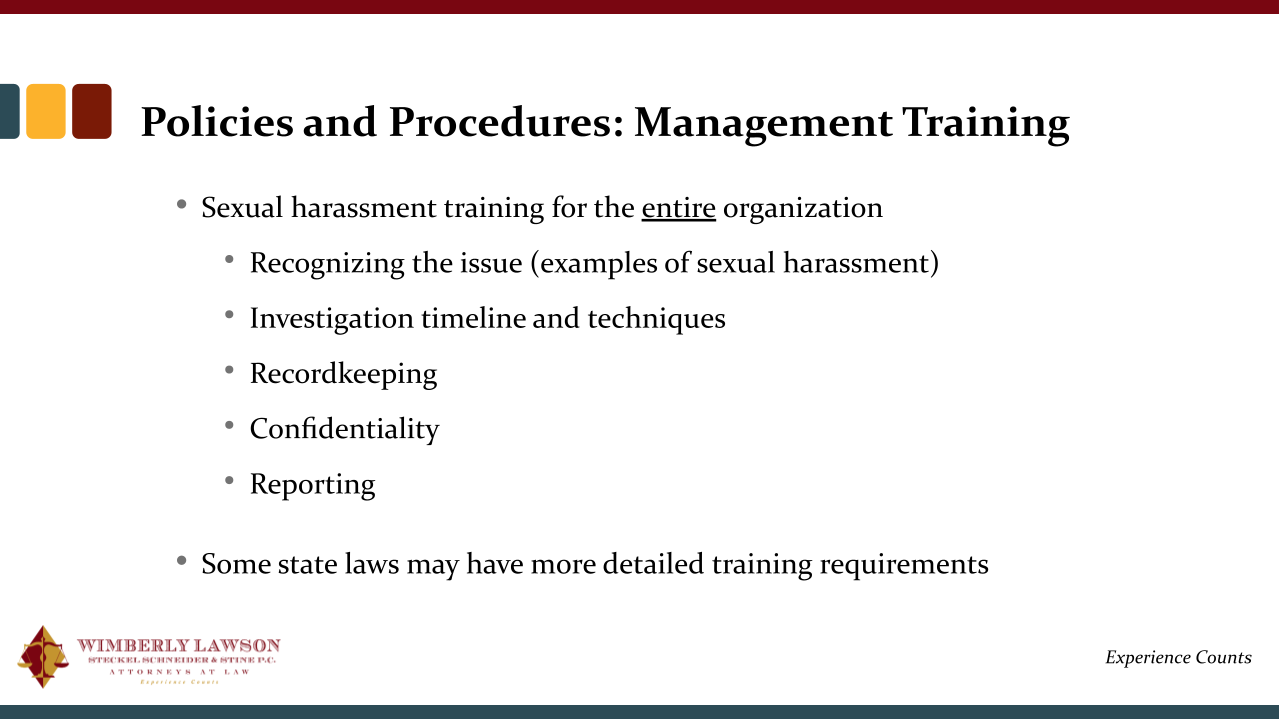
Slide 9
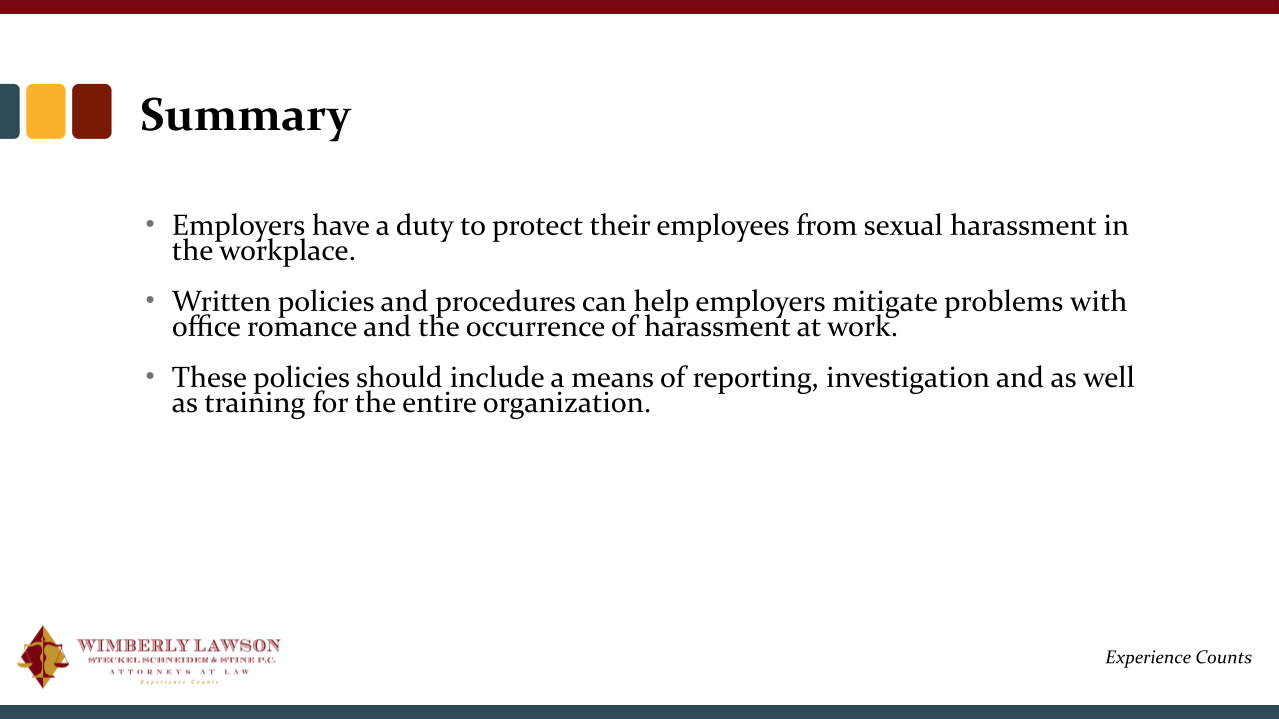
Slide 10

Podcast Transcription
Sheri Oluyemi (00:00):
So, good afternoon everyone.
Paul Oliver (00:02):
Good afternoon.
Sheri Oluyemi (00:04):
Thank you for those joining. I'll introduce myself. My name is Sheri Oluyemi, and I am of council here at Wimberly Lawson, Steckel, Schneider, and Stine.
Paul Oliver (00:15):
And I am Paul Oliver. I'm a partner here at Wimbley Lawson.
Sheri Oluyemi (00:19):
We'll begin. Today's webinar is entitled, love is a Battlefield, the intersection of workplace, romance, and sexual Harassment. I think we have a pretty exciting topic, don't you, Paul?
Paul Oliver (00:31):
Absolutely. Sheri will begin our discussion with a, a little background about how sexual harassment in the workplace operates and the laws that operate in connection with them.
Sheri Oluyemi (00:48):
Over the overview, we're just going to go through office romance versus sexual harassment, basically identifying the differences. We'll talk then about re relevant laws, and then we'll go into the meat of it, which are the workplace policy and procedures. So I really thought we'd start by just understanding the difference between the two. Paul, is this a situation that you have to deal with often with your client? Identifying the line between office romance and sexual harassment, basically identifying what is sexual harassment and what is not. And what I've listed here on the slide are the main types of sexual harassment beginning with quick pro quo. This is the situation where a relationship has fostered in the workplace between two coworkers, where one coworker is a superior, a manager, director a supervisor, and that person is demanding some sexual favors from a subordinate in exchange for advancements of the workplace.
Sheri Oluyemi (02:00):
It could be anything from a promotion to a preferred shift, a shift to preferential, basically <inaudible>, which I believe is Latin for this, for that, or That's correct. Something thereabouts. So this is clearly not just office romance. This is sexual harassment textbook case. This is part of the E O C, which is the Equal Employment Opportunity Commissions definition of sexual harassment. Hostile work environment is another textbook situation of sexual harassment. And this is where the workplace has become severely and pervasively permeated with sexually indu innuendo, such that an employee cannot continue to work there. This has little to do with relationship. It's more of some of the other things I've listed on the slide, which are jokes. Basically jokes that are two sexual email forwards. You find something that you and your friends may laugh that, but you forward it along in the workplace.
Sheri Oluyemi (03:02):
It becomes a hostile work environment for a third party. Pictures. Sometimes some people may put up a picture on the, on the wall in their cubicle, in their workstation, and another might find this offensive. So when these types of things go on and the standard is quite high, it must be severe and pervasive. Then it becomes a hostile work environment, unwelcome advances. Now this treads into the area of office romance. The rule we apply here is one strike in Europe, you can approach an employee for a date, a relationship, once and once that advancement is rejected any further advances would constitute sexual harassment. And of course, the obvious one of physical assaults and, and acts. These are not just sexual harassment, but they could also be criminal liability. That's definitely gone much further than office romance. And the last one on the slide there is stereotyping.
Sheri Oluyemi (04:05):
Here. We usually find women to be at the receiving end, although it can happen to men as well, where the woman is looked at. Well, because you're a woman, you can do A, B, C, and D. You can say A, B, C, and D. Just to give you an example, in a sales team, the men may say, well, let's send a woman in to talk about this pitch, and she'll make it more attractive that stereotyping is, sexual harassment really should not be happening. And there are many, many examples. I'm sure some of you can think of situations that you've handled. But these are just some, some examples to speed. And when you see these types of incidents, you're talking more harassment and not just self romance, the relevant statute. On federal sphere, we have title seven, which is the main statute that prohibits any discrimination, harassment, retaliation on the basis of protective categories, including sets recently, well, 20, it's in 2020 now.
Sheri Oluyemi (05:11):
The bus stop versus Clayton County decision included sexual orientation as a protected category under Title vii. So if you are workplace that has more than 15 employees you are covered by Title seven, and you do have a duty to prevent sexual harassment in the workplace. The occupational safety, the Occupational Safety and Health Act, part of its general duty requirement is that employers create a safe workplace for their employees. So in a situation where domestic violence spills into the workplace and becomes workplace violence, OSHA is implicated and employers have a duty there to prevent that from occurring. Paul, do you want to talk about the two defenses, affirmative defenses available
Paul Oliver (05:57):
To employers? Well for sexual harassment in order for there to be a finding of discrimination, there must be an adverse employment action, meaning somebody has to be fired demoted or some kind of objective action and the harassing conduct there will be no finding of discrimination If the, if the company has properly dealt with the offending conduct, that is, if they're notified of it, they investigate it and take appropriate action, then they will not be violated to be in violation of the sexual harassment laws. Also, the complaining party must the company should have rules and regulations such that the complaining party, if it did not take advantage of those established reporting procedures with respect to sexual harassment and which would prevent the employer from having an opportunity to to remedy the situation, then those are all offenses that are available for sexual harassment.
Paul Oliver (07:16):
Giving to the topic primarily that we are here for, relating to the workplace romance and the intersection with sexual harassment. The workplace romance is not itself a violation moment, but it is a condition that affects the employer in such a way that violations of the sexual harassment policy are likely to occur. So, for example almost all companies have a broad requirements of sexual harassment policies, but they don't have a policy that applies consensual consensual romance policies. Our position is that there should be, because that is a condition or of of the current environment, that there are consensual relationships will, which will, if not properly policed, can cause significant violations of the harassment law and cause damage to the employer.
Paul Oliver (08:38):
Employers should recognize that the workplace currently is such that these were almost employees spend in a significant part of their time, and it is commonplace within the workplace for the workers to have or develop relationships in some of them romantic or sexually. In fact, the one survey from the Society for Human Resource Management indicates that one out of four employees have reported they are currently involved in workplace romances or have been. This is important because workplace romances affect the environment the workplace and employers should be very careful whenever there's a situation that affects the workplace, it having a romantic re romantic relationship with between employees is often a distraction, not only for the people who are involved, but also other workers. It creates situations where other employees are looking at it as favoritism or possible favoritism. In fact, there might be favoritism involved and other employees are are jealous and it creates a bad morale for the company and almost most significantly such relationships. Although some work out, many do not and can involve in evolve in the situations where there are allegations of sexual harassment.
Paul Oliver (10:33):
Most of us are familiar with. For example, a situation with the Boston Celtics recently, and it's in it in itself, shows a situation where what will happen or can happen when you have a situation where there is an office romance. In this situation, the coach of the Boston CELs, the coach who had led them to the finals of the N B A this year, was involved with one of the employees because of that allegations that that employee made against the, the coach, an investigation was taking place. And of course, this is a very high profile investigation. They hired outside lawyers to come in and do an investigation. And as a result of the investigation, the coach who had coached them to the N V A, they had to suspend him. They suspended him for the remainder of the year and such that he would not even coach any at all this year.
Paul Oliver (11:50):
I say that to indicate that all of this arose out of the situation where there was an officer romance. Apparently there were some additional things as well that are traditional with respect to harassment, and that there were crude remarks either to this, this woman, there were other situations where he hadn't apparently made overtures to other women as well. Some of this is not in the public, of course, cuz this is private information. But the, the Celtics did make sure that they indicated that they did an investigation, they're satisfied with the investigation, and that they have come up with this punishment. Of course, in this punishment, they could have given, they could have terminated him, they could have suspended him. They could have they could have moved him to another position. They suspended him for a year. Lucky for him. He's such a good coach. There's some other clubs, particularly the nets who apparently going to hire him from this. And, and, and so he may still come out of this, but that also shows the different waitings that different companies will give to the fallout from sexual harassment. The Celtics obviously valued differently than it appears that the nets do in terms of, of how they would punish him or not punish him, or the sexual harassment in the in the workplace.
Paul Oliver (13:32):
Sexual office romances can bus, as you see, create havoc for both the offender and also for the company. In this case, the Celtics lost the use of their, their manager for the whole year and maybe for the rest of forever because he's now gonna sign somebody else. How do you prevent those things? I don't think you ever prevent them, but there are ways in which companies have come up with to, to deal with this office romance, which can be such a fertile ground for sexual harassment. One of the most obvious things that companies worry about is for the quit pro, quit pro, pro quit pro discrimination. So the, the first relationship that is dealt with, usually in connection with these office romance policies is that there's a policy that supervises its coordinates can date each other cuz that is the one that is fraught with the most danger.
Paul Oliver (14:52):
But again, there are different ways to prohibit that. You can pre, you can prohibit, prohibit. Do you prevent, some companies will put the onus on the supervisor so that if there's a supervisor in order that he is required not to have any romantic relationship with the supporting some put a broad policy that prevents all employees from dating. Very few do that because just dating itself normally is not, is, is, is is somebody's pro and they, somebody's privacy, you can tell them about that. And it's obviously we create significant morale with employees. So normally it is only employees who are in some kind of special arrangement with working with others or in supervisory relationship with others that are prohibited. Another way of dealing with it is to require that all employees who are involved in a relationship report it to human resources. Again, this is an invasion of somewhat of the, of the person's privacy, and some employees will do it and some won't. But requiring that creates a situation where at least the company is put on notice that there are these relationships that are occurring.
Paul Oliver (16:43):
Many companies come up with what are called love contracts. That is, if there are couples in the workplace who are required to disclose their relationships workplace who have a relationship, they're required to disclose their relationships. And those love relationships or those agreements sometimes contain many different facets, some of which is they, they make the, employ the employees incorporate their, the company's policy on dating and confirm that they're not in a reporting line or represent that their relationship is consensual or that they will refrain from inappropriate or amorous conduct or speech while at work. Or that, but, or even some provide for a waiver or re lease of the company. If there are any fallouts from this office, consensual office romance there has not developed a consensus of how or whether or not companies will have this office romance policy. Many companies do, many companies do not.
Paul Oliver (18:09):
If you have such a policy, you have to make sure that it is properly adjusted, such that if someone violates that policy, you have to determine what it is that you will do. For example, if you have an employee who has a relationship with a manager, the question then, and they have violated the policy, what do you do? And also once they disclose it, what do you do? In each case, you must the, they are a number of alternatives that the company uses to try to figure out what to do. And those decisions themselves are often fraught with danger. For example, you can transfer one employee to a different department, but the question then becomes, well, which one do you transfer? It can be retaliatory. Yeah, it could be retaliatory. Be if be based on the employee's sex mm-hmm. <Affirmative>
Paul Oliver (19:25):
That is transferred. There are many different ways to deal with that. The company can often have the, the participants decide which ones to transfer. But then again, the company may lose in that respect because it may not be the one that the company would choose, right? So there, there are different things that must happen with respect to that. According to one SHRM survey the following actions have been taken in response to violations in the workplace romance policy. And they gave a percentage transferred of one employee to a different employee was 34% of the time, send the employee to the couple, to relationship counseling was 32% of the time. Now, that was a curious one for me because in my experience, I've never seen that occur. Me neither. And I don't really know how that would, would really work in the circumstances to create a situation that will give a reasonable answer to, to the, to the situation that's being affected here.
Paul Oliver (20:46):
21% of the time they say draw up a formal reprimand. In other words, if they violate a policy, you reprimand them and you say, if this continues to occur or have occurred again, then you may be terminated. Fire the defendant workers. Now, if you fire two employees, one who's a manager and one who's subordinate, you now have lost two employees who violated your policy. But again that may be an unintended result of a policy that's, that, that requires that you have to be ready to do it. But in this survey, 20% of the time, both were fired. The removal worker from a supervisory position, 12% of the time, that means demote the person who is the supervisor. Then again, that leads the company in a situation where they had lost a productive employee or, and the most productive position suspend the employees. That generally is what will happen, that there's a suspension for a period of time. But again, there has to be an address by the employees and the company of the offending conduct or to make sure that that doesn't, is not what is occurring. Correct.
Paul Oliver (22:12):
This general statement of the different policies that are available is given in this way because there is no consensus of how you deal with them. Each company has to examine its own culture and its own circumstances of its employees and the facility or procedures of the, of the facilities that you're dealing with, and how it's the best way to deal with this office romance. But I think to failure to address it leads it to a situation that may occur where you are not in a position to be in any way in control of dealing with that situation.
Sheri Oluyemi (23:06):
I agree entirely, Paul, and I'll just contrast that with sexual harassment in and of itself, as Paul had said, while there's no consensus about the office romance policies and procedures, we'd say definitely that's not the case with regards to harassment. Every workplace should have a EEO policy that includes a prohibition of sexual harassment without reservation. We would also advise that it had some examples. It would surprise some of you to know that a lot of people don't realize what sexual harassment is. They just cannot identify where the line is. And that may have a lot to do with their own prior experiences to do with culture to do what with what they've seen in the media. So it is helpful for the policy to have specific examples about what could be sexual harassment and what is not. Another feature of the policy should be a means of reporting the complaint, as Paul mentioned it a little bit earlier, there is an affirmative defense to sexual harassment, and that defense requires there to be an EO policy that has been communicated and effectively enforced in the workplace.
Sheri Oluyemi (24:25):
If the complainant refuses or fails to take the steps in the complaint policy, that is an, an, an affirmative defense for the company. Just to break it down, the company has no way of knowing what's going on between two employees and their offices unless a complainant comes forward to make a formal complaint, even if it's anonymous. The company has no knowledge and therefore it is an affirmative defense that is available only if the company has a policy that outlines the complaint procedures. Again, the policy would be useless if no one knew about it. So it must be distributed, and there must be training on that policy. This is the way the company demonstrate that they've created an effective policy, they've communicated it to their employees. So of course you need that acknowledgement for each employee that they've had the opportunity to receive the policy, to read it, ask any questions, and so on so forth.
Sheri Oluyemi (25:29):
We would also advise that it have a procedure within the policy that talks about how we're going to handle a complaint when it comes forward. We would recommend a prompt investigation. I would say there's some debate as to whether this should be done in-house or through outside counsel. Of course, if you use an attorney, you have the benefit of attorney-client privilege in disclosing any report that's created. But if you conduct the investigation in-house, perhaps your HR team knows the culture of the company better, knows the employees better, they might be more effective in getting witnesses to open up and disclose what they've seen or heard. So, whether your investigation is conducted in-house or through the help of outside counsel is again, another decision that will probably be made on a case to case basis. But
Paul Oliver (26:19):
It's been my experience that most companies that have a, any serious size mm-hmm <affirmative>, have a human resource department that is properly trained to do investigations. They usually use teams to go in and in and, and, and properly investigate and come with conclusions of, of fact. And then decisions are made based on those, those generally work very well for for managers and supervisors. And up to that level, when you reach a situation where executives are involved, or it is one where the the employee is questioning the integrity of the HR investigation, it's those situations where I think it is wise to seek the advice of outside counsel and also to think about hiring a, an outside independent investigator, usually lawyers who are familiar with employment discrimination law to come in and, and evaluate the the who handled the investigation in situations with executives, which which again is what happened in the, in the Boston self situation, is they hired a, a law firm to come out from outside to come inside to do the investigation.
Paul Oliver (27:39):
And it makes sense because because of the publicity and the level of of the person involved, there needs to be an extra degree of care for careful carefulness to make sure that there is an independence, and it's a decision that you can rely on. In other words, part of the, the defense that you would have for for a claiming of harassment is that once it was reported that it was properly investigated independently and in good faith. And what that means in different circumstances, it's different, obviously. You, you want where the person is an executive and is one who might have authority over the HR department or the employees, then you definitely wanna make sure that you have someone outside who can be independent and can give you a decision that you can rely on, and that if you go to court, that a jury or a judge could, could value as independent and made in good faith if you make the decision based on good facts, good evidence, and a proper procedure that gives you a, a, a extremely high leg up when you're having to deal with these kinds of claims.
Sheri Oluyemi (29:01):
And of course, after the investigation, if the allegations are substantiated, you then need to consider remedial actions. And this is something the policy can address. It can talk about some consequences for a perpetrator so that they're aware that their actions could cost them their employment at the company or a suspension, whether you're going to have progressive discipline or whether a situation of sexual harassment is so egregious that it requires summary dismissal. The policy should also talk about some dispute resolution options, whether the parties will agree to sit down for a mediation and whether or not arbitration will be required. Weber Lawson had hosted a webinar earlier this year about the end of mandatory arbitration in sexual harassment cases. So we'll refer you back to Rhonda Klein's expertise on that. But if you do have, if you previously had a mandatory arbitration provision as part of your policy, just know that there is law that says it's no longer required for the employee to arbitrate sexual harassment cases. They can opts to do so.
Paul Oliver (30:12):
That's correct, yeah. In other Lord, even though the new law that went into effect this year requires, makes it unlawful to that you cannot man mandate arbitration for the employee couldn't have that agreement, but it is not enforceable. But the employee, in many cases, they will go along with it because it, it gives them a, a, a procedure, one that is private and so long as it is fair and reasonable and in many cases that I have seen even since then the employee has agreed to arbitration even though it is no longer mandatory.
Sheri Oluyemi (30:58):
Oh, yes, Paul, you were on that webinar as well. So we have our expert right here. Okay. So after you've set up these policies, you should train your managers, actually train the entire organization about the policies, train them to recognize the issue of sexual harassment versus office work, office romance train them on investigation timelines and techniques. Like I said, if you're using your in-house team to conduct the investigation they should start promptly. And some techniques that need to be considered include whether or not they can promise confidentiality, whether or not they should keep notes of their witness interviews, whether or not they should create a formal report at the end of it all, whether or not that report will be disclosed, disclosed to the complainant. And other, other considerations regarding the investigation phase.
Paul Oliver (31:56):
It's important that that in connection with the training or the rules relating to sexual harassment, that if you have a policy romance in the, in the, in the in, in the workplace, that, that be a part of that same training. And, and part of those same rules. It is a subset of the sexual harassment rules. And it is important because it creates a a transparency with, in connection with what the company is requiring with respect to sexual harassment. And it's important that that requirement be clear that it is applicable not only to the employees the supervisors and the managers, but to the entire organization that it is to the executives as well. Because as we've all seen with so much publicity regarding the sexual harassment matters that have come forward, the most significant and ones are where the executives have been involved. If the, if the company doesn't take care to make sure that it it is a policy that it is clear as applicable to everyone in the organization, then it's not going to give legitimacy to the, the lower people who are also involved.
Sheri Oluyemi (33:23):
Oh, we just put a note that if you operate in other states outside of Georgia, you need to be aware that some states have more detailed training requirements and such. You would need to look into the requirements in the states that you have employees. So, just by way of summary, I see we just have five minutes left, which I'd like to turn back to you for any questions. Employers do have a duty to protect their employees from sexual harassment in the workplace as differentiated by office romance. Breeding policies and procedures can help manage any problems that arise. As we've said earlier, you can't prevent office romance. You never know where you're going to find love, but you can certainly have policies and procedures in place to make sure that office romance doesn't become sexual harassment, you create liabilities for the company. We also went over some features of the policies and means of reporting investigation, as well as of course training on those policies for the entire organization. So at this time, we will turn the mic over to our attendees if you have any questions whatsoever. Unlike other days, you will not be receiving an invoice. So please, I think I have Rhonda Valentine.
Speaker 3 (34:49):
Yes. On the very first page that you were talking about the title seven how, what was the number of employees that a company needs to have? Was it 15 or 50?
Sheri Oluyemi (35:02):
15? One five.
Speaker 3 (35:06):
One five. Thank you.
Sheri Oluyemi (35:07):
Of course.
Paul Oliver (35:08):
I wanna just make one comment relating to what the topic was, is that is the intersection of office romance with central harassment. Again, as we indicated romance historically and as it occurs now will occur in the workplace in if a company tries to completely shut down, yet it just drives it underground. So the question is whether or not the company should try to regulate it or leave it alone. Many companies completely leave it alone and leave their normal sexual harassment for rules and regulations and policies to deal with that situation, as well as every other situation where there is harassment. The thought for companies who want to be proactive with respect to a situation that, you know, in most circumstances could very easily lead to or be, be a situation where people would be taking advantage of is this romance in the workplace.
Paul Oliver (36:31):
I think that while many companies do not have any policies, having some recognition that romance in the policy and romance in the office is discouraged, is important because we all know that for most situations, having that romance will negatively affect the company rather than positively affected almost in all circumstances. And is certainly can create more situations in the office that the company has to deal with in terms of morale, in terms of situations like that. So to the extent that the company can proactive in terms of having policies that deal with it and be ahead of the, the curve, I think that it is important. But again, what there is no one policy fits all for all companies. I think that it is important for you to evaluate or have someone evaluate your company and what its history of situations like that are and how to make it properly fit your situation.
Paul Oliver (37:51):
But I do think that it is worthwhile to have some policy to be, to put yourself in a situation where you are not making a new, a certain, the same decision many different times. If you have a policy for it, then you are more protected than if you are going by the seat of your pants each time and dealing with the issues that arise because they will arise, as we said, the society, the, the, the survey that we said 24 to 25% of people in the workplace say they have had relationships in the, in the workplace. Some of them, if they, if it does not affect the environment of the work, it doesn't matter. But the problem is many workplace relationships fail, or they're entered into for bad purposes by one party or the other. In those situations, it can negatively affect productivity and deal and negatively affect the actual operation that you have for your company. So again, as the LA the history of the last few years will tell you is that, that, that if you do not control yet, you'll subject yourself to a situation where you will end up having to to deal with it in a situation like Boston Celtics.
Paul Oliver (39:29):
But whether it's a high executive or a supervisor or a manager or just an employee, it is to the extent that that relationship affects the workplace. The company needs to take some action to try to protect itself from the negative effects of those situations.
Sheri Oluyemi (39:53):
Well said, Paul. We are at the end of our time slot. Again, we thank you very much for being with us this afternoon during the lunch hour. We hope you got something out of it. Please feel free to reach out to us via email or telephone if you have any follow up questions that you'd like us to handle one-on-one.
Paul Oliver (40:12):
Thank you very much. We appreciate your time and attention.

